Conjunto Quisqueya is a Merengue musical band from the Dominican Republic. Active since 1972, the band has released several albums and reached international fame.
The band was formed in the early 1970s by two University of Puerto Rico students, the Dominican Republic citizens Aneudy Diaz and Adib Melgen. [1] They were later joined by Javich Victoria and Chuky Acosta, [2] to form the foursome that would make the group famous.
The group of friends created the band at first to meet women and be able to get (alcoholic) drinks, according to Melgen. [1]
The group debuted during 1972, [3] at first appearing at the "Show de las 12" television show in Puerto Rico's canal 2. [2]
In 1973, Conjunto Quisqueya released their first musical album, which was produced by Paquito Cordero, a Puerto Rican television and music producer. [1]
One particular thing that happened to the group at first was that, since all four of their singers had lived in Puerto Rico for a long time, during their first tours as a musical group to their native Dominican Republic, their countrymen and women at first thought they were "boricuas" (slang word meaning Puerto Rican). [2]
The band mostly played at nightclubs until they were able to score a major hit with a song named Los Limones (The Lemons), which was an international hit for the group. [1] That song was from a release they named Aneudi y Chuky y su Conjunto Quisqueya: Que Bueno 'Ta este Pais (Aneudi And Chuky and Their Conjunto Quisqueya: This Country is Good!) [4]
During the late 1970s and through the 1980s, Conjunto Quisqueya toured the Caribbean and other areas with their music, always returning to Puerto Rico to perform at canal 2's television shows. Another major hit during that era was Maria Cristina. [1] La Juma (The Drunkenness), Bebo Hoy, Bebo Mañana (I'll Drink Today, I'll Drink Tomorrow), [5] Felicitame (Congratulate Me), Lamento del Soltero (Single Man's Blues) La Banca Borracha (Drunken Bank), El Brindis (The Toast), La Trulla Navideña (The Christmas Carol), Mi Piel (My Skin) and what was perhaps the band's best known song, Dame La Mano, Paloma (Give Me Your Hand, Dove) were also major hits for the band. [6]
Late in the 1980s and early in the 1990s, Chuky Acosta attempted a solo career with success. The group, however, continued recording and touring.
During a recording session in October of 1992, member Aneudy Diaz felt ill. He started complaining of a headache to Chuky Acosta when he suddenly fainted. After awakening, Diaz started speaking incoherently, which alarmed his band-mates and caused him to be taken to a nearby hospital for treatment and evaluation.
Diaz was diagnosed with a terminal brain tumor. The album that the group was recording was released, under the name of La Llorona Loca (The Crazy Cryer). Remarkably, despite the dire diagnosis he had been given, Diaz finished recording the album as well as the album's title song and went on tour with the band once again, also participating on a video which was recorded for La Llorona Loca. Ultimately, Aneury Diaz died on May 28, 1993. [7] The group then decided to take off a couple of years before performing again. They finished participating in concerts they had already been contracted to perform at before retiring for a short period, beginning in 1994. According to Melgen, after Diaz's death, the band did not feel motivated to perform anymore. [1]
A few years later, the group returned with a new lineup, and it has performed, on and off, since. During December of 2021, Conjunto Quisqueya performed at a concert titled Noches de Navidad (Christmas Nights) in Santo Domingo. [5]
Members of Conjunto Quisqueya have included: [8]
Danny Rivera is a Puerto Rican singer and songwriter born in San Juan whose career spans nearly 50 years. He is well known in Puerto Rico for his political activism. In 2008, Rivera acquired Dominican Republic citizenship. After 12 years of work, Danny Rivera and Nelson González in 2014 finished work putting new life into the classical bolero - in Spanish. Rivera and González Hit the Heart of the Latin American Song Book on Obsesión
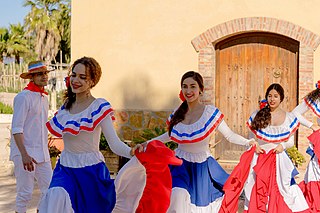
The music of the Dominican Republic is primarily influenced by Western European music, with Sub-Saharan African and native Taino influences. The Dominican Republic is mainly known for its merengue and bachata music, both of which are the most famous styles of music in the Dominican Republic, and have been exported and popularized around the world.

The Music of Puerto Rico has evolved as a heterogeneous and dynamic product of diverse cultural resources. The most conspicuous musical sources of Puerto Rico have primarily included African, Taino Indigenous, and European influences. Puerto Rican music culture today comprises a wide and rich variety of genres, ranging from essentially native genres such as bomba, jíbaro, seis, danza, and plena to more recent hybrid genres such as salsa, Latin trap and reggaeton. Broadly conceived, the realm of "Puerto Rican music" should naturally comprise the music culture of the millions of people of Puerto Rican descent who have lived in the United States, especially in New York City. Their music, from salsa to the boleros of Rafael Hernández, cannot be separated from the music culture of Puerto Rico itself.

Merengue is a type of music and dance originating in present day Dominican Republic which has become a very popular genre throughout Latin America, and also in several major cities in the United States with Latino communities. Merengue was inscribed on November 30, 2016 in the representative list of the Intangible Cultural Heritage of Humanity of UNESCO.

Juan de Dios Ventura Soriano, better known as Johnny Ventura nicknamed El Caballo Mayor, was a Dominican singer and band leader of merengue and salsa.
Marvin Santiago was a Puerto Rican salsa singer who became famous all across Latin America during the 1970s. He was also a part-time comedian on Puerto Rican television.

Pedro Ortiz Dávila, better known as Davilita, was a popular Puerto Rican singer of boleros and patriotic songs. He was the first artist to record the Rafael Hernández standard "Lamento Borincano".
Octavio Ramos Pumarejo, known professionally as Tavín Pumarejo, was a Puerto Rican jíbaro singer and comedian. While better known for his work as a comedy actor on Puerto Rican television, Pumarejo released 16 albums of Puerto Rican music, with some of them becoming major hits in the island.
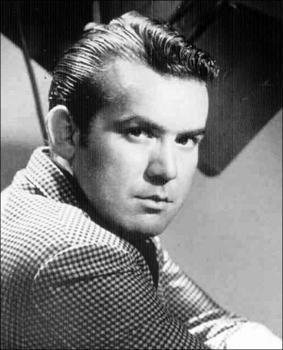
Paquito Cordero, was a pioneer of Puerto Rican television. He was also a comedian and a musical and television producer.
Gisselle Ortiz Cáceres, known mononymously as Gisselle is an American Merengue singer of Puerto Rican descent.
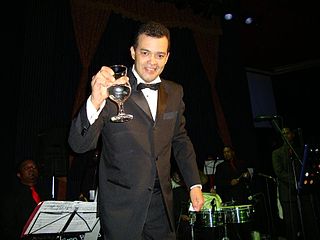
Alex Bueno, originally born as Alejandro Wigberto Bueno López, is a singer and guitarist from the Dominican Republic, specializing in merengue and bachata music, but also having ties in salsa, bolero, merengue típico, ballad and more. He broke out onto the scene in his early life and has been on the Dominican music scene for over 40 years. Having been an artist for so long, he has amassed a large fanbase in the Dominican Republic.
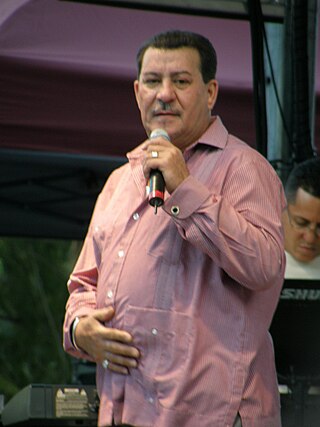
Julio César "Tito" Rojas López, also known as "El Gallo Salsero", was a Puerto Rican salsa singer and songwriter.
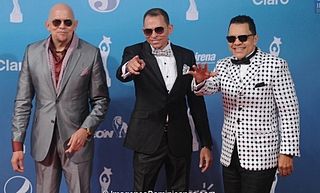
Los Hermanos Rosario is a merengue band, originally consisting of brothers Toño Rosario, Pepe, Rafa and Luis.

Luis Alberti was a Dominican Merengue musician, arranger, conductor, and author of significant popular songs such as Compadre Pedro Juan and many others performed and recorded by noted interpreters with diverse backgrounds.

Ojalá Que Llueva Café is the fourth studio album by Dominican singer-songwriter Juan Luis Guerra released in 1989 by Karen Records. It is considered one of his most emblematic and important albums. The album set the musical path for his later albums, re-formulating Dominican merengue and bachata music through the contemporary elements of pop, rock, salsa, or jazz. Incorporating socially conscious lyrics with danceable merengues and romantic-poetic bachatas, the album is considered one of the most important albums of his discography.
While the Dominican Republic is known for shaping merengue and bachata music, its musicians have also melded these influences into the early development of salsa music amongst the Latin community of New York City in the early 1960s. A major development in those initial days of salsa occurred when Johnny Pacheco, a Dominican-born musician living in New York City, teamed with partner Jerry Masucci to create Fania Records in 1964. They started selling records from the trunk of cars on the streets of Spanish Harlem, signing up young artists, creating new sounds, and eventually having hit records. Over the next 15 years, Fania Records helped define the sound, culture, and language associated with the salsa genre, a musical movement that arose partly from the unavailability in the United States of music produced in Cuba.
Miguel Poventud a.k.a. "El Niño Prodigio de Guayama" and "Miguelito", was a Puerto Rican musician, singer, actor and composer of Boleros. Among the singers who have interpreted his musical compositions are Johnny Albino, Héctor Lavoe and Daniel Santos.

Navidad Boricua: Mi Pueblo esta de Fiesta is one of the compilations made by Puerto Rican artists with songs that reflect the Christmas tradition of Puerto Rico. In this album are various singers of Puerto Rico as Joseph Fonseca, Michael Stuart, Grupo Kaos, Plenéalo, Daniela Droz, Andy Montañez, Los Sabrosos del Merengue, Junny Ramos, Salsa Kids, Mary Ann Acevedo, among others. The last version of this compilation, Navidad Boricua has raised over half a million dollars to over fifteen foundations highly needed in the Island. All money raised from the album sales were destined for Puerto Rico Down Syndrome Foundation and the Foundation Anthony "Junior" Soto.

Héctor Elpidio Acosta Restituyo, better known as Héctor Acosta "El Torito" or simply Héctor Acosta, is a Merengue and bachata singer, and politician from the Dominican Republic. In 2020, he was elected senator representing the Monseñor Nouel Province before the Senate of the Dominican Republic; he was reelected in 2024.
Alberto Amancio Beltrán was a Dominican singer, known as "El Negrito del Batey", after his first signature tune. He mainly sang in the genres of bolero, son montuno, mambo, merengue, and guaracha. After recording in the Dominican Republic with René Hernandez' orchestra, he moved to New York City in 1961 to work with La Sonora Matancera.